LabGuy's World: Extinct Sony Prototype
VTR's of the 1950's &60's
Directions: For a larger view of any image,
click on the small image. To return, click your browser's back button.
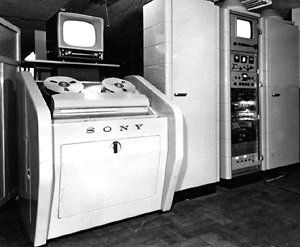 |
Quadruplex VTR: The very earliest VTR at Sony!
Approximately 1958 or 59. Two inch tape, 4 heads running transverse, 15
or 30 inches per second tape speed. A shamelessly brutal copy of Ampex's
quadruplex machine. Right on, Sony! HELP! More info needed!! Photo:
Sony History Web
Site. |
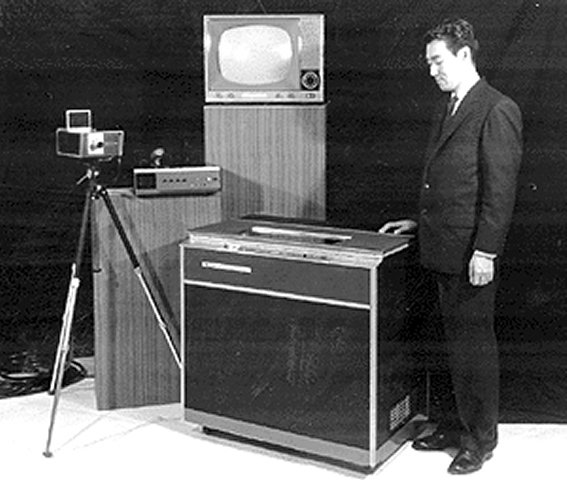 |
SV-201: Very early 1960's color capable helical
scan, 100% solid state. One of Sony's very first VTRs. Need more info on
this one! Photo: Sony
History Web Site. |
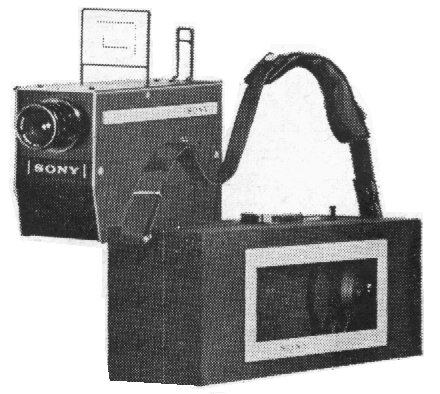 |
(Original Entry) CV-2000???:
Prototype CV format portapack(?). No model number is given in the magazine
article. More info desperately needed on this one!!!! Update: I have identified
the camera as a CVC-2000. One was offered
for sale on ebay recently. Photo: Electronics
World Magazine - November, 1966. |
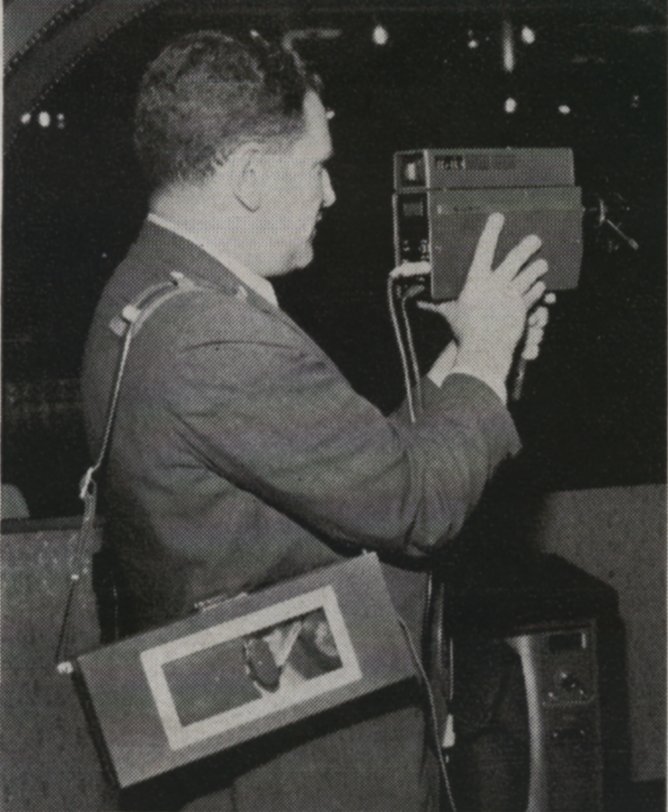 |
Mystery Solved!: CV-2400
Prototype Portapack: The above
entry has been on my CV/DV page since I started the site. That original
photo really sucks. And Electronics World magazine was vague about the
product. But, in Popular Photography magazine November 1966, I found the
following photos and a complete description of the product! Of course,
no model number was given. It didn't have one! So, we will just call it
the "CV-2400 prototype portapack" for this discussion. * This is the prototype
for the production model [DV-2400 portapack].
This thing is way ahead of its time. It is very small, has coaxially stacked
reels and external batteries. Recording format was totally compatible with
the CV-2000 series of skip field VTR's. The final DV-2400 portapack was
very different looking than this prototype and set the pattern for many
of the portapacks that followed. However, this prototype did influence
the designs of some other early portapacks like the Panasonic NV-8080 (non-EIAJ)
and NV-3080 (EIAJ) as well as the Shibaden
SV-707
(non-EIAJ).
* All of Sony's reel to reel portapacks had the number
four in the second digit position: DV-2400,
AV-3400,
AV-8400.
That is why I call this machine the CV-2400. It may well have had that
exact model number. That would explain nicely why the production model
was called the DV-2400! |
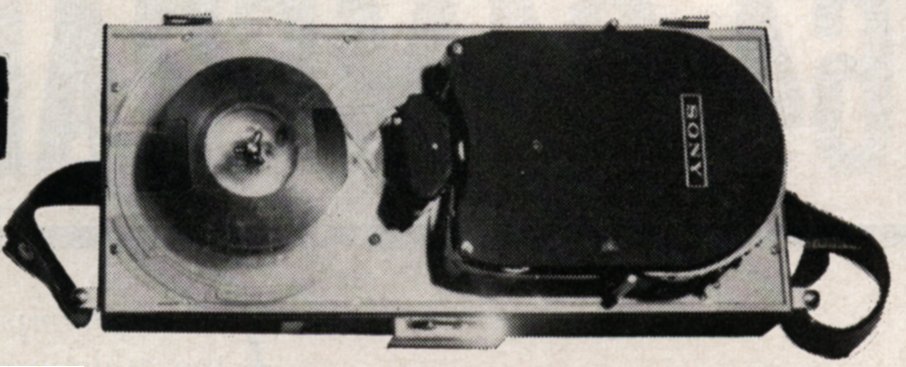 |
CV-2400 Prototype Portapack:
This photo shows the top of the deck clearly. On the left are the two stacked
reels. On the right is the head drum scanner. The feed reel is on the bottom
and the take up reel is on the top. This machine is record only. Judging
from the photos of the demonstration, the camera was AC powered while the
deck operated from batteries. A battery powered camera ws probably not
ready at that time. The VTR is alleged to weigh 9-1/2 pounds (21 kilos).
It's dimensions are 4. 5 x 5. 5 x 12. 8 inches. That was very compact and
light for ANY reel to reel portapack ~ EVER! If it is like the DV-2400,
then this machine had no rewind function. On the DV-2400
you placed the recorded tape onto a deck VTR to rewind it or used a
small comical hand crank to rewind the tape on the portapack. |
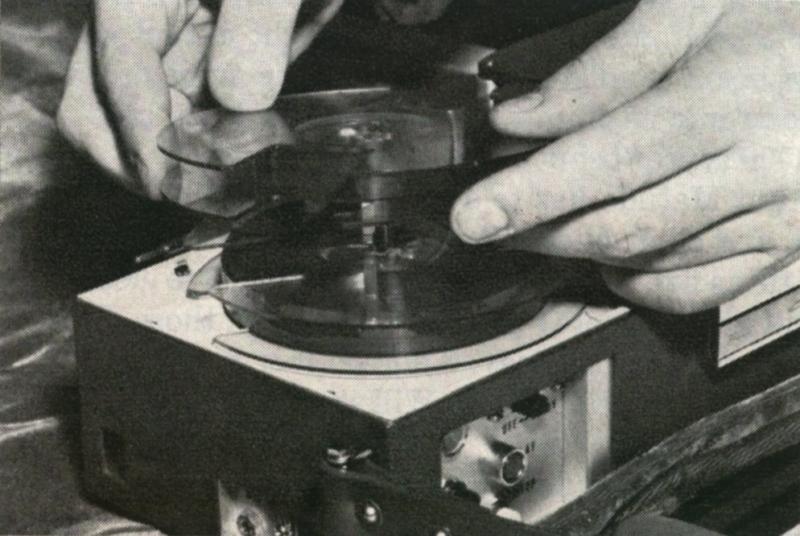 |
CV-2400 Prototype Portapack:
Here, you can clearly see the reels being loaded onto the deck. It is claimed
that the 5" spool would record for 30 minutes with 1 mil polyester tape.
Tape speed is 7-1/2 IPS. Recording time could be doubled by using 1/2 mil
tape. I doubt if this was ever done, as the back tension is pretty high
on these VTRs and thin tape would have stability problems ~ mainly stretching.
The VTR could run for 6 hours from the battery. That is how I figured that
the camera was running on AC power! The camera was a modified CVC-2000.
It was revamped with the addition of a one inch CRT video monitor viewfinder. |
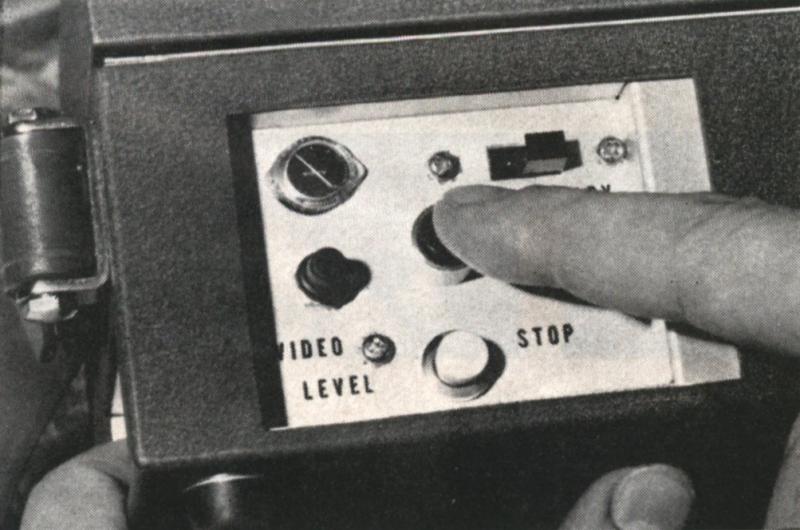 |
CV-2400 Prototype Portapack:
This is the control panel. Not much to it. Off / on switch, standby switch,
stop switch, level meter and level control. The camera had the start and
stop buttons installed in the crude pistol grip. The operator was more
concerned with holding up the ungainly CVC-2000
camera and trying to get steady shots than with operating the VTR. As usual,
if I am wrong about anything and you know the facts, drop me a line and
set me straight! ~LabGuy~ |
[HOME]......[SONY
CATALOG]......[CATALOG
INDEX]
Last updated: January 09, 2005 |